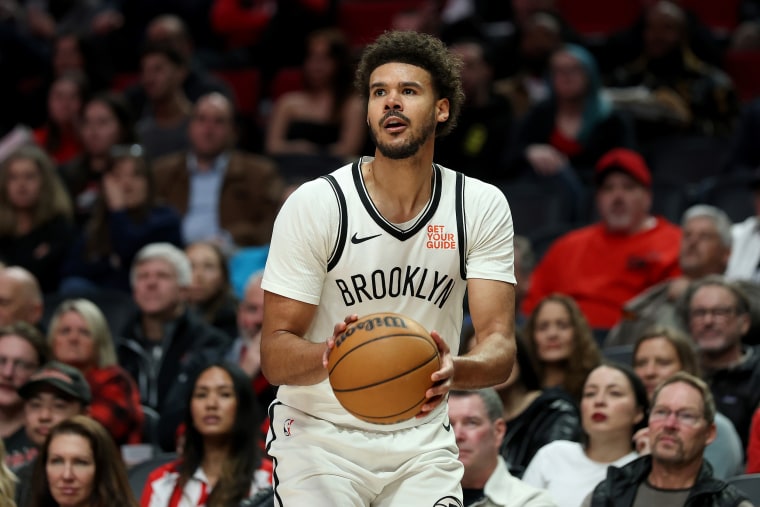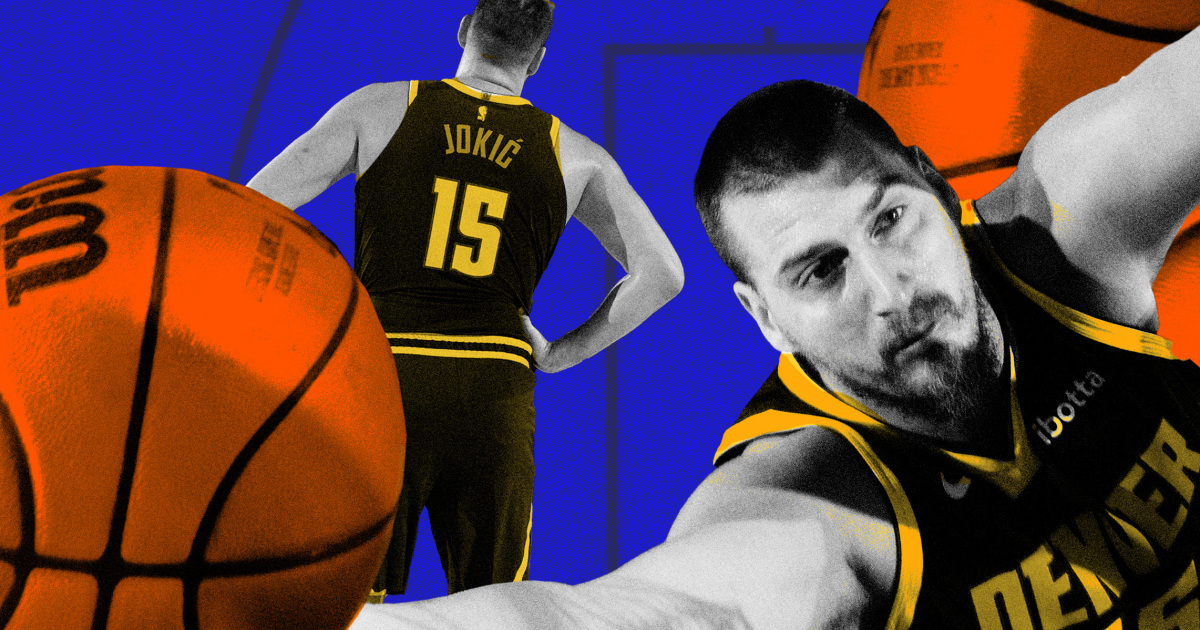Since the start of the 2020-21 NBA season, Denver Nuggets center Nikola Jokić has finished either first or second in the MVP voting five straight years, winning the award three times.
Over those five seasons, however, the Nuggets made it to the conference finals or beyond only once — in 2023, when Denver won its first championship in franchise history (and Jokić was named Finals MVP).
In every other year during that period, Denver lost in either the first or the second round of the playoffs. That makes Jokić — whom NBA general managers voted most likely to win MVP this season — somewhat of an outlier. Since 1984, every player who has won at least three MVPs has also won multiple championships.
So how do the Nuggets plan to build a champion around the best player in basketball? It starts with their new front office.
“We all understand the magnitude of what a player like [Jokić] brings to an organization, a community, a city and a fan base,” Denver’s vice president of basketball operations, Ben Tenzer, told NBC News this month. “In terms of expectations, we welcome the responsibility that comes with that. We’re a very lucky situation to be in our jobs and having a player like Nikola that’s obviously so special.”
Tenzer began his NBA career with the Nuggets in 2005, and he has been with the organization since then, aside from a brief stint in law school. He was named head of basketball operations in June after Denver overhauled its front office earlier in the year.
Tenzer was hired in conjunction with Jon Wallace, who was named vice president of player personnel. Wallace began his executive career with Denver in 2019 before he spent the last three seasons with the Minnesota Timberwolves.
The two were brought in to provide stability after a roller-coaster finish to last season.
In April, shortly before the start of the playoffs, the Nuggets fired both general manager Calvin Booth and head coach Michael Malone, who played key roles in the 2023 title run.
But it was an open secret around the league that there was friction among the coaching staff and the front office. Between the tension and a slip in its regular season record, Denver made the shocking move to part with people who helped deliver the franchise its only ring.
The month after a second-round loss to the Oklahoma City Thunder in the playoffs, in which the team pushed the eventual champions to seven games, the Nuggets hired two people to figure out how to build a sustainable title contender.
It’s now Tenzer and Wallace who will be tasked with capitalizing on having not only one of the game’s greatest players, but also the remnants of a championship core that includes explosive point guard Jamal Murray and do-it-all forward Aaron Gordon.
The two heads of the front office were aggressive in the summer. Their first move of the offseason sent a shock wave through the league, as they traded forward Michael Porter Jr. — a former first-round pick and member of the 2023 title team — and a 2031 first-round pick to the Brooklyn Nets in exchange for Cam Johnson.
“It was very difficult,” Wallace said of the decision to part with Porter. “Mike’s done amazing thing for the organization. We had to make some type of change. Mike wanted to be in a position where he can let his game grow a little more, but at the same time, we needed somebody to fill a role similar to what Mike does but also have some other positives in areas Mike was somewhat deficient in.”
 Cam Johnson of the Brooklyn Nets looks to shoot against the Portland Trail Blazers in Portland, Ore., on Jan. 14.Steph Chambers / Getty Images file
Cam Johnson of the Brooklyn Nets looks to shoot against the Portland Trail Blazers in Portland, Ore., on Jan. 14.Steph Chambers / Getty Images file
While surprising, the trade for Johnson made sense. He is nearly as good a 3-point shooter as Porter, while offering some more variance offensively, particularly as a passer and a cutter. Johnson is also regarded as a much better defender than Porter, who was frequently targeted by opponents.
In addition to the trade, Tenzer and Wallace also made three significant free-agent signings, acquiring 3-point marksman Tim Hardaway Jr. and center Jonas Valanciunas and bringing back guard Bruce Brown, who played for the team during the championship season.
“The simplest way to look at it is we felt we needed depth,” Tenzer said about the team’s approach in the offseason. “That was the thought with the special run we had in the playoffs: If we had a little more depth, it would have gone a long way. We weren’t really trying to reinvent the wheel; we felt like the bones were really strong.”
Depth was certainly an issue in the Nuggets’ loss to the Thunder.
In that series, Denver outscored Oklahoma City by 34 points in the 142 minutes its starting five shared the floor, despite multiple starters’ dealing with injuries by Game 7.
In the series’ 196 other minutes, when the Nuggets had at least one bench player on the court, the Thunder outscored them by 98.
Wallace said one of the goals of the summer was to increase depth without sacrificing experience. Brown won a championship with Denver, while Hardaway and Valanciunas have combined to appear in more than 100 playoff games.
(Valanciunas can especially provide a boost, as the Nuggets have historically struggled whenever Jokić is on the bench. In each of the last four seasons, Jokić has ranked in the 100th percentile in on-off differential, per Cleaning the Glass.)
“OKC can make a sub and they can throw one of five guys at you that don’t have a drop-off in defensive pressure, don’t have a drop-off in creativity, don’t have a drop-off in rim protection,” Wallace said. “You got to find guys who understand the nuances of the game to combat that. For us, it was pinpointing guys who had the skill set but a personality to play under pressure.”
According to Wallace, it’s not only the Thunder but playoff basketball in general that demands that teams be able to adjust their style of play on a nightly basis without giving up their identity.
“You now have to construct your rosters to the point to almost with the football mentality of we’re not going to sacrifice our principles, but we might play nickel coverage just this time, we might play double coverage on this guy this time,” Wallace said. “And you got to have guys with an IQ to be able to switch that over.”
Said Tenzer: “If you’re in a Game 7 and you have one shot, you want as many tools as possible.”
The vision Tenzer and Wallace have for Denver is clear: a roster that both amplifies what Jokić does and has the ability to play multiple styles depending on the opponent.
The offseason certainly served that blueprint.
Johnson offers more variety than Porter; Valanciunas and Hardaway provide veteran competence off the bench. Brown is a more well-rounded and less streaky player than the departed Russell Westbrook.
Head coach David Adelman, who was named interim coach after Malone’s firing and then hired in the summer, should have more options to experiment with his lineups, from smaller, switchable units to a double-big look with both Jokić and Valanciunas on the floor.
Tenzer and Wallace showed flexibility themselves, remaking the team despite the challenges of the NBA’s latest collective bargaining agreement, which has chilled player movement and introduced a byzantine spending structure that Tenzer described as “almost a hard cap.”
They did so while also trying to re-establish a culture of communication and openness across the organization after the April shake-up.
Ultimately, though, while their moves look tantalizing on paper, Tenzer and Wallace will be judged by whether they can help deliver a championship-level roster around the game’s best player.
“There’s more so obligation than pressure,” Wallace said, adding that he and Tenzer are putting their own spin on what has already been built to get the team over the top.
Tenzer said: “I wouldn’t really characterize it as pressure. We definitely understand the magnitude of the responsibility, and what’s exciting is that creates a lot of opportunity for us.”

